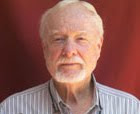PART ONE
Yesterday evening I was to attend a memorial service for David McCalden, the conceptual founder of the Institute for Historical Review. McCalden was a beloved, cranky, intelligent, womanizing, engaging, odd individual. We had our bad times, but I remember him with real affection and admiration.
The get-together, not really a “service,” would be held in Manhattan Beach at a Chinese bar, where all our four-times-a-year get-togethers happen. In order to be certain that I would be there on time, 6pm, I would have to drive north to the border and cross into California by 12 noon. Here in La Gloria my car was in the shop with a busted steering wheel and an electrical short that my mechanic could not locate.
So I would have to get a bus to Tijuana, a taxi to the frontier, walk across the bridge, wait in line with the other terrorists to cross over, catch a streetcar to Chula Vista, then another taxi to Budget Rent a Car where I had reserved the least expensive automobile they rent. It all went pretty well. I arrived at Budget at 12.30pm.
While I’m waiting at the front desk two Chinese men enter. They are each well over six feet tall, in their mid-thirties, slim and well-built, good-looking, and in good humor. My first reaction on seeing them there is to note how tall they are—and then suddenly thought has me back in Korea in 1951, more than half a century before. I had nothing to do with it. Thought was on its own, living out its own existence.
It was probably a February morning, and the day was just breaking. We were one platoon of infantry lying in a couple snow-covered rice paddies in a small, narrow valley. A road ran north/south through the length of the valley and the Chinese were coming south at us. We were to hold where we were. We had no support. Even the company machinegun squad was with another platoon. We had our M-1 rifles, a few grenades, and that was it.
I was glad to see day breaking. Sometimes when the Chinese came there were a lot of them and when they came at night it could be a real bother. Now that a winter light was seeping through the clouds we could relax a bit. We could heat coffee. We could talk, horse around a bit. And then one of the guys gave a yell and we dove on our faces. There was some shouting back and forth. I didn’t get it.
And then I saw that straight ahead, maybe sixty yards, there was the head and shoulders of a Chinese soldier, his arms raised as if he were surrendering. He was close enough that he could have shot a few of us before we would have known what was happening. None of us stood up. A couple of the guys yelled at him. Get up or get shot. The Chinese stood up, his arms above his head. He started walking toward us. A couple of our guys went out to meet him and shake him down.
In another couple minutes he was standing there in full quilted uniform, with the fur cap, in the center of a dozen American soldiers and everyone was laughing. It was remarkable. We could have been killing each other, but we were laughing.
There was a Chinese kid in our platoon from Fresno and he began translating. The Chinese was just tired of the fighting. The worst part of it was American air. He had deserted his unit the night before and crawled toward our line in the dark. He knew he was taking a chance, but he somehow felt that if waited for daylight and showed himself the way he had that we would not shoot him. He was right.
He was a tall, well-built man in his early thirties. He was one of the tallest guys there in the paddy, well over six feet. He had an intelligent, good looking face and a winning smile. Everyone took a shine to him. He was very much like the two Chinese who came into the Budget Rent a Car office while I was waiting to pick up my reservation.
Only now it occurs to me to imagine how it might have been if I had had a way to introduce myself to the two Chinese there in the office, tell them the story that thought had just flashed back to, and invite them to have a beer. I would have other stories to tell them about the Chinese in Korea, which might encourage them to recall a couple stories about Americans that they had been told by their fathers and uncles, or that they had witnessed for themselves.


0 Comments:
Post a Comment
<< Home